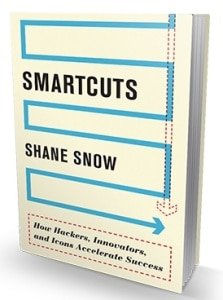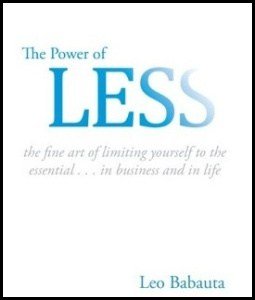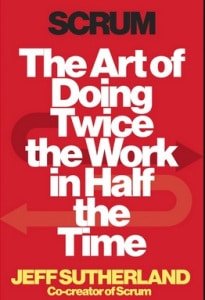Thirty-year-old Shane Snow is a millionaire. And that was before he wrote one of the most compulsively readable game-changing books that I’ve ever seen. I loved it so much I read it three times and gave away several copies to friends.
Ever wonder how some people zoom to the top at lightning speed? Frequently it’s because they took the “smartcut.”
Hacking the Ladder…Training with Masters…Rapid Feedback…Simplicity…10x Thinking….
Here’s what a smartcut isn’t. It isn’t a shortcut, which Snow defines as cutting corners, which means: being dishonest, lazy, or doing the minimum.
Further, smartcuts aren’t just doing the same thing more efficiently. Efficiency might make a system 25% faster, save 20% more fuel, etc. Smartcuts, however, might double, triple, or even 100x your results.
What are the Smartcuts?
- Hacking the Ladder
It’s faster than climbing the ladder, which doesn’t work half of the time, anyway. Examples of famous ladder hackers include Teddy Roosevelt and Dwight Eisenhower, who never ran for anything until he ran for president.
- Training with Masters
It’s great when you have access to a world-class mentor, but apparently, you can learn just as much from someone who is out of reach. World-class musicians, for example, might previously have made it their mission to listen to everything Mozart ever composed—and to learn everything they could about his life, methods, and beliefs. Their goal: be able to predict with near certainty how Mozart would think and act.
- Rapid Feedback
Suppose you create a product. With rapid feedback, soon you’re on version 2.0, then 3.0, then 4.0—and then it’s a game-changer for the world. Beats working in isolation for six years and then finding out no one’s interested in what you’ve done.
- Platforms
A platform is a tool or environment that lets you go farther even faster. “If I have seen further it is by standing on the shoulders of giants.” – Isaac Newton.
- Waves
Study your environment and put yourself in the right place at the right time. Ride the big wave into the Promised Land.
- Superconnectors
This is when you learn how to effectively connect with as many people as possible. Or you help a superconnector, who introduces you to everyone.
- Momentum
You get “fast results” when you work steadily, month in and month out.
- Simplicity
“Everything should be made as simple as possible, but no simpler.” – Albert Einstein. What shockingly counter-intuitive advice from a contender for the title of “The Smartest Person Who Ever Lived.” So much for over-complicating things.
- 10x Thinking
Tiny goals don’t inspire. Not only that, “The problems we have cannot be solved with the same level of thinking we had when we created them.” – Albert Einstein, who is always worth quoting twice.
With smartcuts, you still must work hard. It’s just that what you’re doing will probably result in greater blessings for more people.
Example #1: Hacking the Ladder
Did you know that several great presidents like Eisenhower were actually elected to nothing before they won landslides?
And while many Senators dream of being president, did you know that the average senator is elected at age 57, while the average president is elected at age 55? In other words, to state the obvious, more than 99% of all senators will never be president.
And that’s in spite of their “Climbing the Career Ladder.” Maybe they were first in their state legislature. Then they moved up the House of Representatives. Now they’re in the Senate. And not going any further.
In fact, Snow points out that more presidents—especially the highly ranked ones—hacked the ladder than climbed it.
Climbing the ladder the traditional actually has a high number of disadvantages:
+ Most people never advance past the middle;
+ They can’t quit because they’d lose their status, pay, and benefits;
+ They can’t see what the system looks like from the outside; they don’t see the crippling flaws;
+ They buy into all of the “we-have-to-do-it-this-way” thinking;
+ They get used to thinking inside the box; they’ll never say they distrust innovation, but they have their jobs and comfort level to protect;
+ Some even help kill good ideas; they say, “it can’t be done” because “no one has ever done it before.”
So, the presidency is often captured by outsiders: governors who spent no time in D.C. (Reagan, Clinton); generals (Washington, Grant, Ike); business geniuses (Hoover), and party builders (Lincoln, who only spent two years in D.C. before winning the presidency).
When you hack the ladder, you climb to the top of one ladder—like the military ladder—and then switch ladders.
A master ladder-hacker is Arnold Schwarzenegger. Once just a guy who didn’t speak English and who shared a tiny apartment with another weightlifter, Schwarzenegger became the #1 bodybuilder of all time. He then switched ladders to become the highest paid actor of all time. And he jumped again to lead California, which is the eighth largest economy in the world.
Love him or hate him, Schwarzenegger is an incredible man. His autobiography, Total Recall (620 pages) is astonishing; I read it twice. Not only is it loaded with entertaining stories and straightforward admissions & apologies for wrongdoing, Total Recall is also a blueprint for becoming #1. And it illustrates how you hack the ladder: you work your tail off in an intelligent way. Schwarzenegger, no dummy, speaks six languages. And he’s no slacker—when he was in the army and going through basic training, he cut into his sleep so that he could work out an extra three hours a day, everyday. They didn’t even have weights. He had to build his own. With absolute clarity, Schwarzenegger can envision the smartcut.
Example #2: Training with Masters
When you’re stuck, you need more than expert advice. You need an expert teacher—someone who loves you, has your best interest at heart, and yet will never be too hard or too soft with you. You need a mentor!
Smartcuts tells the incredible tale of Jimmy Fallon, who sought out two such mentors: someone close by, and the inaccessible George Carlin.
Fallon was open to everything his local expert could teach. But he had no access to Carlin. So what he did instead was: watch every performance he could get his hands on. And read every book by and about Carlin—several times. He took careful notes.
After a few years, Fallon knew Carlin almost as well as he knew his own parents. In a way, he made Carlin into his most generous uncle, his wise mentor. He learned Carlin inside and out, and knew how he would act in almost any situation.
We can all do this.
Example #3: 10x Thinking.
Just for a week, I’d love to live inside the mind of someone like Thomas Edison (1,093 American patents; 100s of foreign ones), or for that matter, Lori Greiner (120 patents; Shark Tank). Who lit their creative fire?!
They think 10x. Instead of asking, “How can I make an extra $10,000,” they ask, “How can I help ten other people make $10,000 on my way to making a million?”
I could ask, “How can I get six-pack abs?” And that’s hard to achieve. But ironically, I might reach my goal 10x faster if I figured out a way to help a dozen other people get the same thing.
And consider social events. We all go and hope we’ll have a good time. But what if we went instead and asked, “How do I help ten other people have an unforgettable night?”
10x could mean taking what you were going to do anyway—and figuring out how to make it ten times bigger. Or it could mean: choose an outrageous goal and work for it. Something like achieving energy independence for the United States. Or helping a town of homeless kids all get 25s on the ACT exam.
The key? Think realistically.
Or maybe unrealistically. In Smartcuts, Shane Snow tells the tale of Space X, the company that is privately doing rocket science. As the cliché goes, rocket science is unbelievably difficult. And Space X has suffered traumas, just like NASA. But they keep going.
They are like “Conscious Discipline,” an organization that makes schools infinitely better. In one case, they took a population that was 80% below the poverty line (and 20% homeless, with neighborhoods loaded with gangs and drugs) and got practically everyone to score well on the ACT.
10x is when we decide that–like Edison—we’re people of possibility. We’re inventors, creators, and entrepreneurs. We make things that matter.
News You Can Use.
Save time: Smartcuts is about the big picture. It doesn’t quite ask, “How can I manage my time better?” Instead, it might say, “Is this career worth continuing?”
Save money: In a similar way, you can see how people go from $50,000 a year to $500,000 by thinking differently.
Reduce stress: In Good to Great, Jim Collins interviewed a leader of one of America’s top fifteen companies. Long ago, the leader realized: it takes just as much stress in life to be average as it does to be excellent. So, he chose to be a leader and create things that really matter.
Smartcuts exhilarated me. With its amazing true stories and fresh ideas, for me it reinvigorated the world. I felt like I was seeing people and things (like Edison and his movies) for the first time, with their glory revealed. I hope you love it, too.
#
Little Green Book is a newsletter written by Tim Wuebker. Once a week, Tim describes an astonishing book, a real game changer, and/or a riveting read. Not only are these books thrilling, sometime they save you time, save you money, and increase your peace.
No author paid to receive a review. Tim wrote this for free because he loves these books.
The greatest compliments you can give Little Green Book and Tim is to subscribe to this newsletter, and then share it with anyone whom you think would find it fun or useful.
Tim also blogs at timwuebker.com.
Next post: August 17, 2015
Source: Tims Old Blog





0 Comments